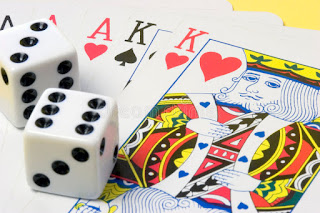Shambala, Chances, Dice and Games
Life
is a game of chances; the 'Shambala principle' derived from an ancient Tibetan
philosophy speaks about the necessity to move forward in life, however big or
small a crises becomes, in life or existence, on our sacred planet Earth, the
need for Hope in humanity and Hope in each other always remains a supreme
belief above everything else, because it is the number one (numero uno) belief
to solving life's problems.
The
chances we take and the chances we make in
solving problems, is critical because, the solutions we are searching for
requires, sometimes an element of chance, luck, and skill which in times of
uncertainty and worry or haste cannot be fully measured or quantified. We
must sometimes lift our hands up high, and find our taste, our breath or our
air, is ultimately a sign our problem is left up to God.
Despite
all our efforts we can only evaluate so much chance and luck, but we must
attempt to evaluate and assess as much as humanly possible, to benefit the
lives of others, so people with detrimented circimstances in life, vastly
improve from a hindered life, so it can take flight and shape.
Buddhist
philosophy and ancient Tibetan philosophy finds ways to quantify the way we
solve our problems and the chances we take to solve those problems is crucial
because it decides our fate. If we solve our own problems by choosing the
wrong initial assumptions, then we cease to fully incorporate all walks and
varieties of life.
Our
problems and mistakes, are sometimes caused by individuals or groups
misbehaving or committing crimes, so they gain or succeed in their version of
life. By 'cutting corners' and not sticking to guidelines or laws or
policies of formality. The wrongdoer's idea of chance and luck is
skewed because their self-assessment of chance or luck becomes two-sided,
one-sided, or bias, which is an incomplete equation. The philosophy of
Shambala is accounting for everything.
God
and karma allows us to evaluate and calculate ‘entirety’, the
world, existence, the universe, all peoples, and our own evaluation and
calculation ends with any remainder sum ‘left up to God’, which is ultimately
second to our own pre-notions and assumptions. If we cannot decide or
calculate the result of our life, out of chance or luck or skill, then we have
reached our human capacity to know, and the rest is left up to God or karma, or
Buddhist teaching.
Shambala
philosophers see chance and luck when solving problems and assessing life and
its entire substance. By doing this, philosophers are able to seek and
destroy the evils in the world, not through artillery or heat-seeking missiles,
but with strong selfless meditations for everyone – people of all kinds.
Life
is a game of chances; the 'Shambala principle' derived from an ancient Tibetan
philosophy speaks about the necessity to move forward in life, however big or
small a crises becomes, in life or existence, on our sacred planet Earth, the
need for Hope in humanity and Hope in each other always remains a supreme
belief above everything else, because it is the number one (numero uno) belief
to solving life's problems.
The
chances we take and the chances we make in
solving problems, is critical because, the solutions we are searching for
requires, sometimes an element of chance, luck, and skill which in times of
uncertainty and worry or haste cannot be fully measured or quantified. We
must sometimes lift our hands up high, and find our taste, our breath or our
air, is ultimately a sign our problem is left up to God.
Despite
all our efforts we can only evaluate so much chance and luck, but we must
attempt to evaluate and assess as much as humanly possible, to benefit the
lives of others, so people with detrimented circimstances in life, vastly
improve from a hindered life, so it can take flight and shape.
Buddhist
philosophy and ancient Tibetan philosophy finds ways to quantify the way we
solve our problems and the chances we take to solve those problems is crucial
because it decides our fate. If we solve our own problems by choosing the
wrong initial assumptions, then we cease to fully incorporate all walks and
varieties of life.
Our
problems and mistakes, are sometimes caused by individuals or groups
misbehaving or committing crimes, so they gain or succeed in their version of
life. By 'cutting corners' and not sticking to guidelines or laws or
policies of formality. The wrongdoer's idea of chance and luck is
skewed because their self-assessment of chance or luck becomes two-sided,
one-sided, or bias, which is an incomplete equation. The philosophy of
Shambala is accounting for everything.
God
and karma allows us to evaluate and calculate ‘entirety’, the
world, existence, the universe, all peoples, and our own evaluation and
calculation ends with any remainder sum ‘left up to God’, which is ultimately
second to our own pre-notions and assumptions. If we cannot decide or
calculate the result of our life, out of chance or luck or skill, then we have
reached our human capacity to know, and the rest is left up to God or karma, or
Buddhist teaching.




Comments
Post a Comment